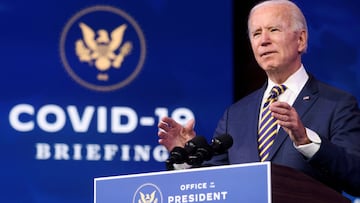$2,000 stimulus check: who would be eligible for third payment?
Amid the coronavirus pandemic, President-elect Joe Biden has pledged to get Americans a third stimulus check after taking office.

US President-elect Joe Biden has stated his determination to get more direct money to Americans after he takes office, branding the $600 maximum figure in the second round of stimulus checks as "not enough".
It remains unclear exactly how much a third stimulus check would be for, but it does appear that eligibility for the payment could be broadened, at least when it comes to dependents.
President-elect Biden: "We need $2,000 stimulus checks"
"$600 is simply not enough when you have to choose between paying rent or putting food on the table," Biden posted on Twitter on Sunday. "We need $2,000 stimulus checks."
Speaking to reporters in his hometown of Wilmington, Delaware days previously, the Democrat also said: "We need more direct relief flowing to families, small businesses, including finishing the job of getting people the $2,000 relief direct payment."
Schumer: $2,000 checks a priority
Democratic Senator Chuck Schumer, who is poised to take over as the Senate’s majority leader after Jon Ossoff and Raphael Warnock’s run-off-election wins in Georgia handed the Dems control of the upper chamber, is also eager to push through a third, larger stimulus check.
"One of the first things I want to do […] is deliver the $2,000 checks to the American families," Schumer told a press conference on Wednesday last week.
At the end of December, Democrats in Congress attempted to up the $600 second stimulus check to $2,000, voting in the House to add $1,400 to the maximum figure - but the plan was scuppered when the legislation was blocked from advancing in the Senate by its hitherto Republican majority leader, Mitch McConnell.
Democrats' attempts to increase the size of the check came after President Donald Trump called for a $2,000 top figure to replace what he described as a "ridiculously low" $600 maximum. Having won a majority in both the Senate and the House in November and January's congressional elections, the Dems are now better-placed to succeed.
That said, their wafer-thin advantage in the Senate - the chamber is a 50-50 split, but Democratic Vice-President-elect Kamala Harris will have a tie-breaking vote - gives them little room for maneuver if there is dissent from senators within the party.
For example, West Virginia Senator Joe Manchin has expressed his skepticism over the need for further direct money.
Not clear if third check would be for $1,400 difference or full $2,000
Schumer has declined to clarify whether Democrats’ renewed push for the $2,000 payment will target a third check for the figure in full or for the $1,400 difference between $600 and $2,000, although Biden’s talk of "finishing the job" of getting a bigger amount for Americans suggests it could be the latter.
Biden was due to unveil his post-inauguration stimulus plan on Thursday.
- Democatic senator calls for "targeted" relief bill
- What is the next step in the Trump impeachment process?
Who would be eligible for a third stimulus check?
In the second round of checks, which were approved as part of a $900bn, bipartisan coronavirus relief bill, individuals earning under $75,000 a year have received the full $600 amount, with joint-filing married couples on a combined income of up to $150,000 sent $1,200.
Those on up to $87,000 ($174,000 for joint-filers) have received a gradually smaller figure - following a formula by which the payment drops by $5 for every $100 over the initial income threshold for individuals - while households have also been able to claim an extra $600 per child dependent aged 16 or under.
Judging by the terms of the CASH Act, the bill with which the Democrats sought a $2,000 check in December, the starting threshold for a third payment seems likely to be similar or identical to the above, but a greater number of dependents may qualify for additional credits.
Under the CASH Act, the full amount again went to those on up to $75,000 ($150,000 for couples), before steadily going down - by $5 for every $100 once more - for higher earners up to a cap of $115,000 ($230,000).
Were the third check to be for a maximum of $1,400 rather than $2,000, the same post-$75,000 phase-out rate would lead to a final earnings limit of $103,000 ($206,000).
Dependents aged 17 and over were included in Democrats’ CASH Act, having been left out of both the second round of stimulus checks and the first batch of payments approved in March. The CASH Act called for $2,000 each for dependents; it is not clear how much they would get as part of a third run of checks.
Related stories
Meanwhile, claimants who file taxes jointly with someone without a Social Security number qualified for the second stimulus check - after being left out of the first payment - and therefore should also be eligible for the third.
Stimulus check and US politics: live news
You can stay up-to-date with the latest news on stimulus checks and US politics by following our dedicated live blog.

